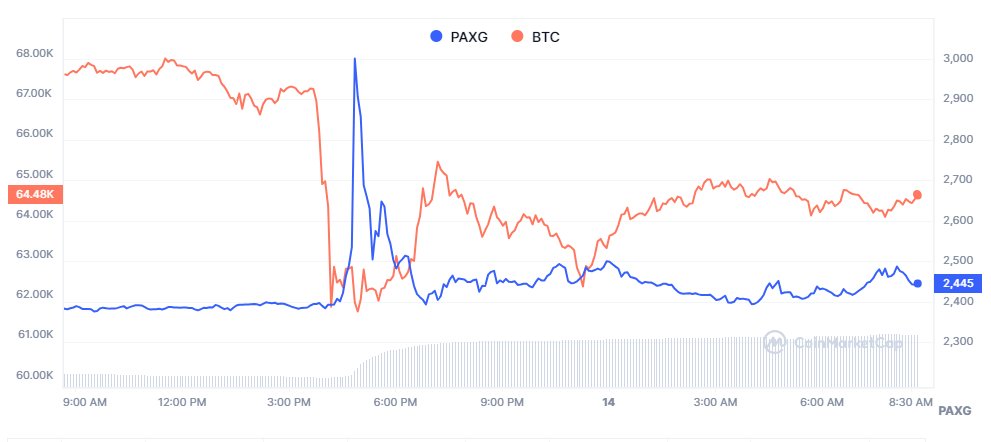Over the weekend, Paxos’ gold-backed digital asset surged to record highs amidst escalating tensions in the Middle East.

Amid escalating tensions in the Middle East, the gold-backed digital asset from Paxos reached an all-time high over the weekend, prompting some to query the value of Bitcoin’s value as a hedge against geopolitics.
The PAXG gold-backed cryptocurrency token peaked at $2,855 on April 13, while Bitcoin prices plummeted $5,000 in a matter of hours, falling from over $67,500 to around $62,700, according to CoinGecko data. The daily decline for Bitcoin was 7.5%.
“Bitcoin may be many things, but it is not a geopolitical hedge,” Bob Elliott, former Bridgewater executive and co-founder and CEO of Unlimited Funds, wrote in an X post.
The weekend witnessed an escalation of geopolitical tensions in the Middle East due to an Iranian missile and drone assault on Israeli targets.
The former research director of Bridgewater Associates further stated that this past weekend served as a solid empirical trial, as Bitcoin traded with a “virtually perfect negative correlation to PAXG over the last day.”
He further stated, “If anything, it’s becoming an even worse hedge over time,”

At the time of writing, the PAXG token had retreated to its previous spot gold-linked price level of approximately $2,376 due to its inability to maintain momentum.
Since the start of March, the asset has increased gradually but steadily, by 20%, in tandem with the underlying precious yellow metal’s price, which peaked last week at $2,400 per ounce.
Others, however, noted that the Paxos token is extremely illiquid, trading for only $36 million per day in contrast to the billions of dollars that significant high-cap crypto assets trade-in.
“Checkmate,” an on-chain analyst for Glassnode, remarked that “indubitable market commentators” are those who “post about the price of an illiquid gold token trading higher today as a dunk on Bitcoin.”
In the meantime, Elliot noted that Bitcoin demonstrated comparable market behavior to gold in the aftermath of the October 7 Hamas attack on Israel, when it declined in value while the latter rose.
Elliott further stated, “These correlations look to be getting more negative over time,” citing the Russian invasion of Ukraine in February 2022.
He added, “BTC largely traded randomly in a relatively tight range in the lead-up and following the invasion,” Gold prices increased by 12 percent in February and March of that year.
In addition to referencing price movement during the onset of the Russia-Ukraine conflict, analyst Willy Woo stated that Bitcoin “recovery happens within days.”
From a geopolitical standpoint, Elliott concluded that Bitcoin is not a store of value asset and that its wider application may more closely associate it with aggregate financial assets.
“Along the geopolitical dimension, its pretty conclusive BTC is not ‘digital gold.’”
Bitcoin had already begun to recover from the weekend decline as of the time of writing, with early trading on April 15 seeing it surpass $65,800.
